39 Messages to People Who Self-Harm, From People Who've Been There
Editor’s note: If you struggle with self-harm, the following post could be potentially triggering. You can contact the Crisis Text Line by texting “START” to 741-741.
Article updated July 22, 2019.
In honor of Self-Injury Awareness Day, we teamed up with To Write Love on Her Arms to ask people who consider themselves in “recovery” from self-harm one question: What’s one message you want to send someone who self-harms and isn’t as far along on their journey?
Their answers bust self-harm out of the shadows, and prove if you do self-harm, you are not alone. There is hope, and people are ready to support you.
But don’t take our word for it. Here are messages from people who’ve been there:
1. “You are worth more than the harm you do to yourself. Learning to love yourself is the start.”
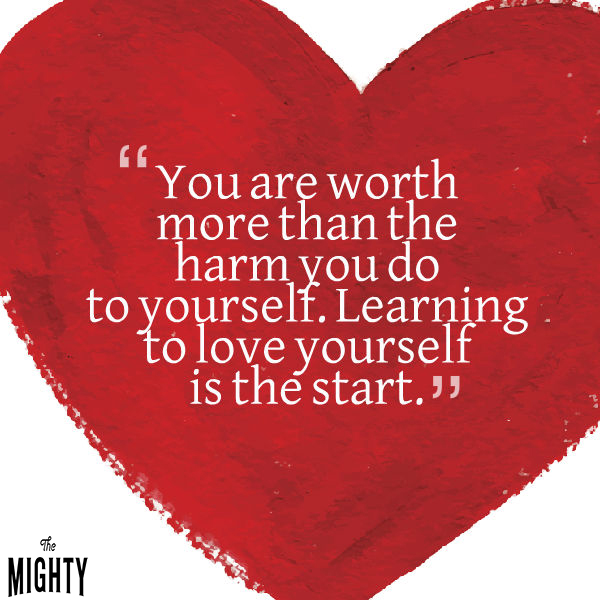
2. “Find other ways to satisfy the urge. Call a friend. Color paper. Take a shower. Take a walk. Listen to music. Do whatever you need to do to make the urge go away. You are loved, and it will be OK.”
3. “I’m almost three years self-harm free. I never thought I would live to be 20, let alone happy and healthy. It’s hard, and recovery isn’t pretty. It comes with relapses, nights alone crying and fighting the urge, feeling utterly alone. But the most beautiful thing happens when you realize it’s been a week since you hurt yourself. Then a month, and eventually a year. It’s all worth it.”
4. “Forgive yourself. Forgive yourself for feeling upset, depressed or angry — or whatever it is that’s driving you to self-harm. Self-harm does not make you weak or shameful; it is a symptom of something more. You can recover, although it might not be easy. Learn to be patient with yourself and others throughout the process, and always forgive, so that you can move on. None of these things will be easy, but they will all be worth it.”
5. “Don’t be afraid to talk to people. I promise there are so many human beings who have such a deep love for you; they want to listen to your pain… they want to listen. Conversation is key towards healing, towards recovery. We rarely talk about relapse, yet it is part of reality. And each relapse is a building block to self love. But you are strong and you are resilient. We are all rooting for you.”
6. “Your recovery is your recovery, but it can be a collective experience. Be gracious with your story and your journey.”
7. “Recovery will not happen by telling yourself you need to stop. You’ve known that all along. Recovery happens as we learn to trust this life to hold us through what we cannot stand.”
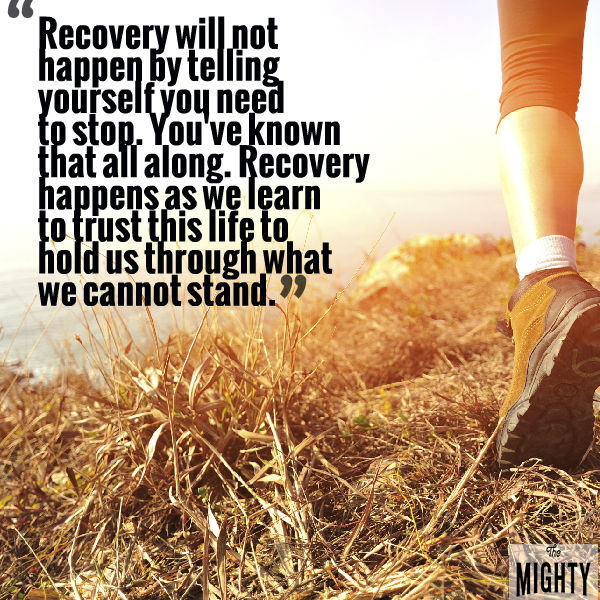
8. “You’re strong enough to be enough for yourself. There is an inner beauty you will discover within. Look at your wrist and kiss your arm with your mouth, gently. There is love and hope left for you yet, I swear it.”
9. “Relapses or backslides can happen, and through it all, you have to be kind to yourself. Shutting everyone out, living with the guilt and shame… this only hurts you more. You have to let people in.”
10. “Give yourself 15 minutes before you react. During that time, talk it out either with yourself or someone you trust. After 15 minutes, try responding instead of reacting. Do something to improve the situation that triggered the urge, whether that’s leaving the location you are in, writing down your feelings or staring at yourself in the mirror telling yourself you matter and can choose something better in this moment.”
11. “So many people say the word ‘never.’ Never give up. Never be afraid. Never feel shame. That’s so negative, the word ‘never.’ I say try. Try to love yourself. Try to forgive yourself. Try to talk to someone about it, if you can. And you know what? If you just can’t do any of that right now, that’s OK, too. You’re going to be OK.”
12. “You are a warrior, fighter and you are strong.”
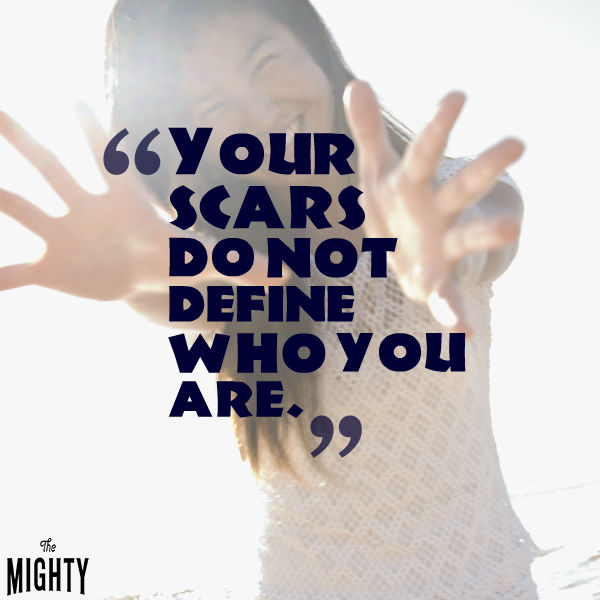
13. “A relapse does not determine your future. The urges will go away even if you don’t act on them. It can be grueling and difficult to wait them out, but they will go away. You are not alone in this. Never forget that.”
14. “Realize you need people. Hiding and recoiling seems to be the gut reaction, however don’t let it take over. Find people you trust and share with them. No matter how silly you might think you sound, share it! Let others in so they can hold you up when you can’t yourself. We need other people.”
15. “It’s OK to ask for help. You don’t have to handle it on your own.”
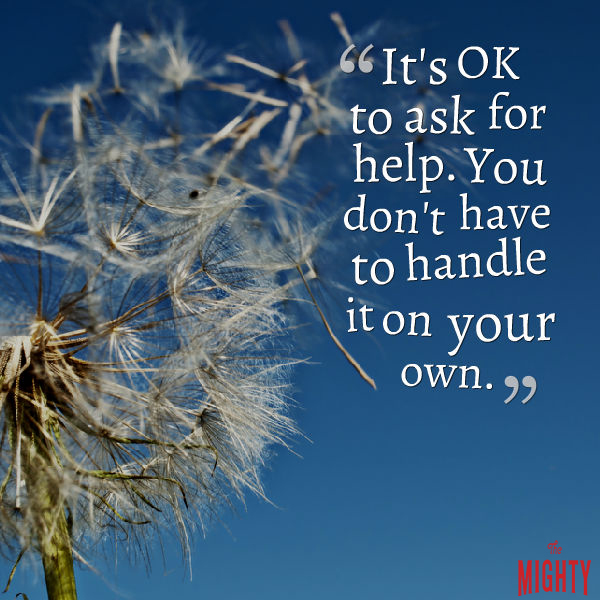
16. “I’ve discovered the best way to avoid relapse is to keep your hands busy during rough times. Create, color, write… whatever you can do to keep your thoughts busy. I know this can be easier said than done, but it has helped me.”
17. “Your scars are not a prison sentence. Yes, they may physically remain part of you, but they do not define who you are. You will get there. I know, because I am in recovery myself.”
18. “Remember the flame you have inside, deep deep deep between your chest and stomach. It might be tiny, but it is there for you to take care of it. Stick to it because it will give you its power, show you that nothing is over.”
19. “Your body is your own, and it is not worth destroying.”
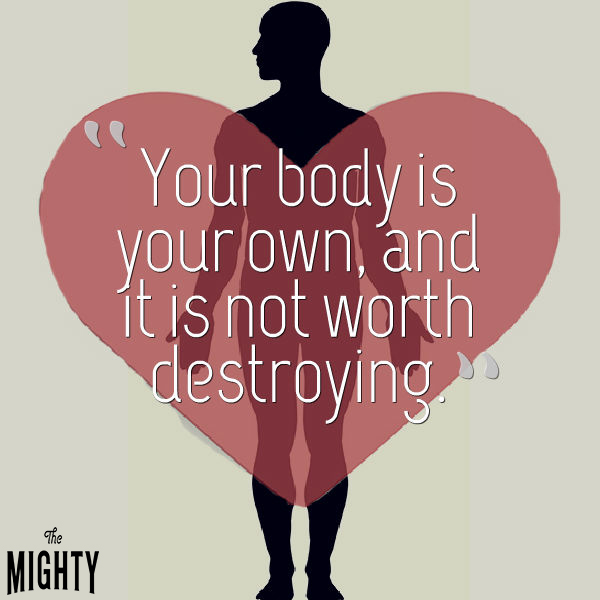
20. “Recovery is a process, and you cannot expect to get better overnight. It’s all about the little victories, and each day without self-harm is a celebration!”
21. “Appreciate your beautiful skin and its ability to heal.”
22. “You. You are amazing and you are embarking on a long journey. No. It won’t be easy, it will be hard. You will find yourself stuck in a canyon every now and then, and you will make your way past these canyons.”
23. “You will have days that are harder than others. You will always think about your history, and you will always have days where relapse comes into your mind. But you will learn how to deal with those days. You will look those days in the eye and you will rise above. Why? Because you are strong. You are a fighter. And you will make it through this.”
24. “There’s a different story than the one that’s been written on your body for too long. The hurt and pain etched out in those moments of grappling to stay alive — it isn’t the only story. There’s this different narrative — one where you look in the mirror and speak love over your life; where you put down the self-punishing speak; where you choose not to harm, but to heal. And day by day you make choices. And before you know it, you learn what self-care looks like and you whisper compassion into your broken pieces. There can be forgiveness and hope and there can even be light — lots of light!”
25. “You’re not alone in this. We were never meant to face our pain alone. Even when you feel alone, there’s always someone waiting to help. It’s so hard to reach out your hand. I know. But it will change your life. And you will be glad that you did. Your story is so incredibly important. You can do this.”
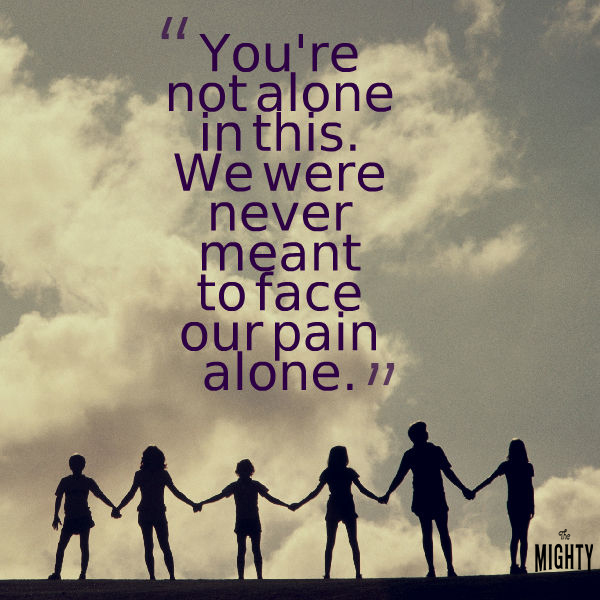
26. “I believe in you. We believe in you. The world is ready to take you on. Show the world you can beat this illness. It doesn’t define you.”
27. “It may make the pain better momentarily, but it doesn’t take away the pain on the inside. It only masks it for a little while, and covers our beauty in shame.”
28. “If you hurt yourself today, don’t be ashamed. Forgive yourself, tell someone you trust and let them in next time you have urges. Forgive yourself and look ahead, because even if you can’t see it now, eventually you’ll realize your life is so bright. You’re worth this fight. And you have warriors all around you ready to fight right along side you.”
29. “Always be honest with yourself. Let yourself feel the emotions you’re feeling at all times, and don’t try to push them away. Be honest with the people who love you. Reach out to them when you’re feelings become too much.”
30. “Write a love letter to yourself, write down all the you love about your life and why recovery is worth it. Keep it in a special place and when you feel like you’ve lost control, read it. Read it when you have an urge to relapse. Give yourself a few moments to breathe. This is only temporary, and it will get easier. I promise.”
31. “Eventually there will come a day when you will not want to hurt yourself, but nurture yourself instead. You will realize you are worth more and deserve more. As time goes by, the urge will be less and less. And as time goes by, you’ll gain the courage and confidence to not hide the scars and to not hide your story.”
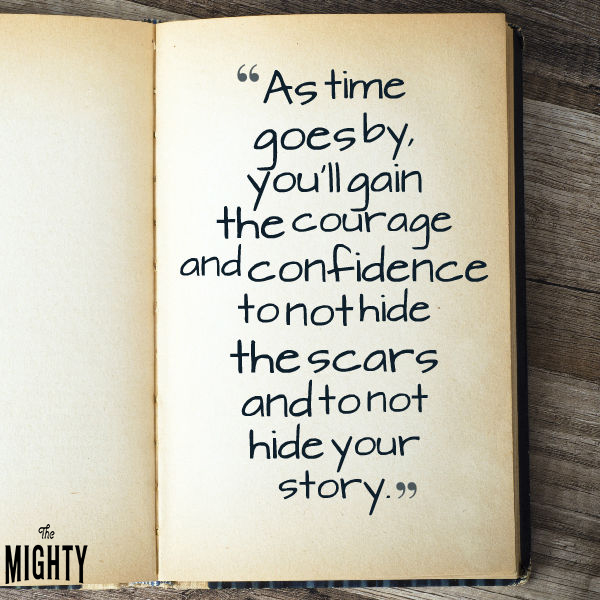
32. “I know the pain seems unbearable right now, and I know it seems to feel better when you’re cutting, but you will get through this. There are so many beautiful things coming to you.”
33. “I’ve been sober from self-harm for about three months now. It’s a hard struggle, but I learned that while I can’t control my thoughts, I can control my actions.”
34. “It’s important to believe in yourself. Just be patient. One day the darkness will go away and you’ll catch a glimpse of a better future. When this happens, go for it. You are strong enough to stop self-harming and you are good enough to love yourself.”
35. “Even if you don’t believe it, you are strong enough to weather the storm in your head. Those first few steps into recovery don’t make you weak, because you are so strong for wanting to fight for yourself. Recovery can be scary and wonderful and difficult and beautiful, and talking about it will help you heal the scars on your heart, too.”
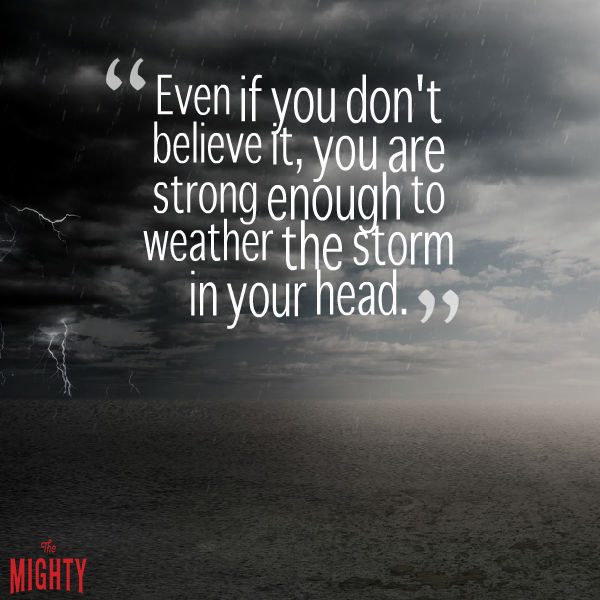
36. “You’re allowed to hurt, to feel without knowing what you’re feeling. You’re allowed to cry and to feel weak; but you are strong and you are enough. People need you and to hear your story because your story is important.”
37. “Even going one day without self-harming is a step in the right direction. It may be a little step, but sometimes the little steps are what take us the furthest. Aim for one day, then two, then three — until you reach many days, and eventually, with enough perseverance and self-love, those many days can become years.”
38. “Surround yourself with people who will celebrate your little victories just as much as they do the big ones. Every step is a step in the right direction, no matter how small.”
39. “Be honest. Don’t hide. Healing is possible, and there is a way to feel real and alive without self-harming.”
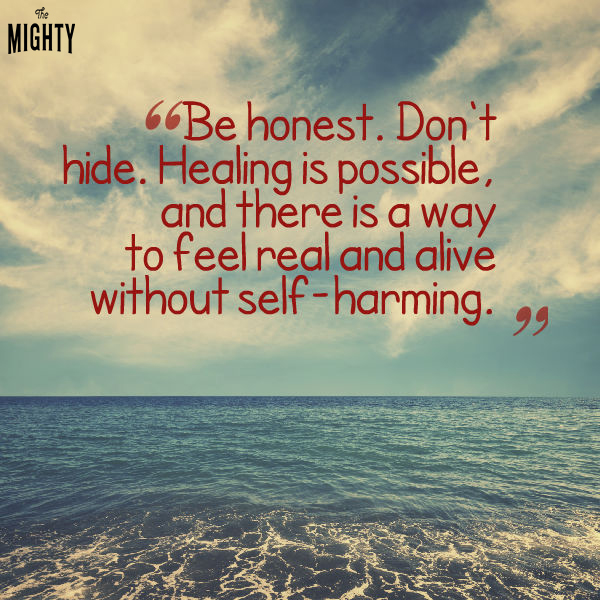
*Answers have been edited and shortened.
If you or someone you know needs help, see our suicide prevention resources.
If you need support right now, call the Suicide Prevention Lifeline at 1-800-273-8255.

